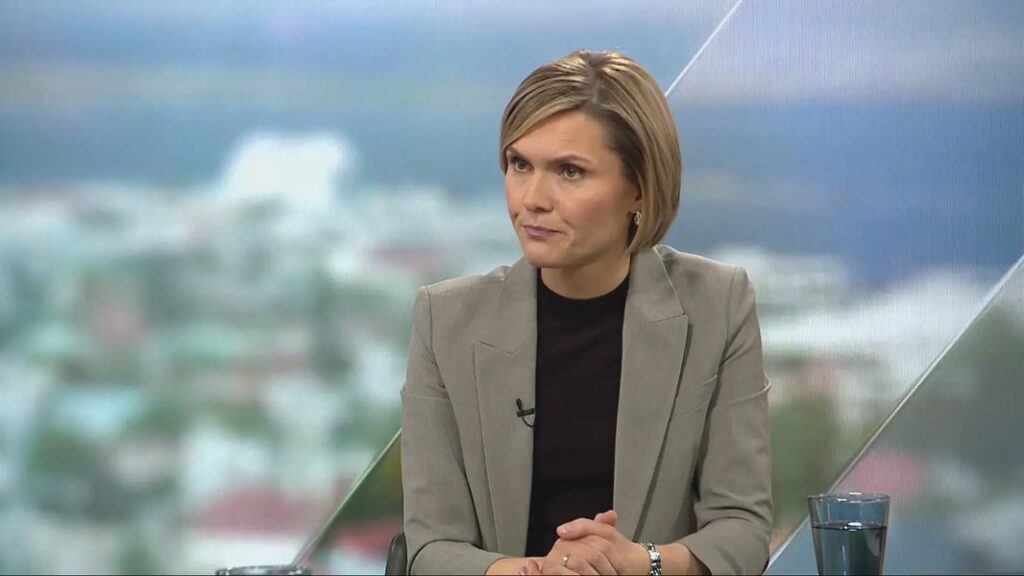The government has announced measures aimed at bringing balance to the housing market. The goal, it says, is to increase the number of homes, lower prices, and make housing support more targeted.
The government’s action package is in part a response to the Supreme Court ruling in the so-called interest rate case, as commercial banks have paused or restricted the granting of indexed loans while a court case concerning such loans is under way.
To eliminate uncertainty in the lending market, work is being carried out in cooperation with the Central Bank to establish an interest rate benchmark that can form the basis for indexed loans with variable rates.
Plans had been in place to abolish the tax-free option to use private pension savings to pay down mortgage principal. Now, however, that measure will continue to be allowed – but for a maximum of ten years.
At yesterday’s presentation, it was also announced that a new 4,000-apartment neighbourhood will be developed in Úlfarsárdalur, aimed primarily at young people and first-time buyers.
On the government’s website, it says that it plans to introduce the following measures:
Response to the Supreme Court ruling
- In cooperation with the Central Bank of Iceland, begin publishing an interest rate benchmark as soon as possible to serve as a basis for indexed loans.
More homes at lower prices
- Higher initial grants immediately to non-profit housing associations.
- Simplified building regulations, more efficient supervision, and digital building permits.
- A new 4,000-apartment neighbourhood in Úlfarsárdalur.
- A new approach based on cooperation between Reykjavíkurborg (City of Reykjavík) and the labour movement.
More targeted housing support
- More shared-ownership loans, monthly allocations, secured financing, and broader eligibility.
- Make the general authorisation for tax-free use of private pension savings to pay down mortgage principal permanent and predictable – allowing all homeowners to use this option for 10 years.
- A consultation process will be launched on ways to increase public participation in private pension saving.
Reform of the housing system
- Reduce tax exemptions on capital gains for those owning multiple properties, decrease tax discounts on rental income, and prevent rent increases during the first 12 months of temporary leases.
- Allow municipalities to impose a property tax surcharge on undeveloped urban plots.
- Pass the Airbnb bill in Alþingi, limiting short-term rentals to a person’s registered residence and one additional property outside urban areas.
- Introduce rules on minimum repayment speed to lessen the impact of indexed housing loans, to take effect in 2027.
- Sell assets of the Housing Fund worth tens of billions of ISK to reduce state debt.
- Pass bills in Alþingi establishing mandatory registration of rental contracts and merging the Planning Agency and the Housing and Construction Authority.

“We increasingly want housing to be people’s homes”
After announcing the measures, the Prime Minister, Kristrún Frostadóttir, discussed the plans on RÚV’s Kastljós.
“We primarily want people to invest their savings in value creation within Iceland, not in competing over concrete,” said Kristrún.
Kristrún said that while measures which increase demand can maintain or raise prices, what matters is which group they target. Making the pension scheme permanent and increasing the funding for shared-ownership loans from ISK 4 billion to ISK 5.5 billion would particularly help young people.
There has been considerable uncertainty in the lending market following the Supreme Court ruling on Íslandsbanki’s interest rate changes. The government, in cooperation with the Central Bank, plans to issue a formal interest rate benchmark for banks to reference.
Asked whether this would make it easier for banks to offer similar loans to those available before the ruling, Kristrún said the government could not compel banks to issue specific types of loans. She said lenders, such as banks and pension funds, had complained that there was no “anchor” for indexed loans with variable interest rates.
The development following this ruling could very well lead to a reduced role for indexation in the economy, making it less dominant than before. That in itself need not be negative. Many feel indexation has too much influence. But the pace of its reduction matters, and there must be something to replace it in the meantime. We naturally want to smooth the transition if possible.
Measures to reduce the financialisation of housing
Kristrún said the main change announced today was a significant simplification of building regulations, which would make construction more efficient and cost-effective.
What we are also doing is introducing an authorisation – not an obligation – for municipalities to impose additional property tax on plots that have been allocated but left undeveloped, possibly due to market speculation. We know full well that land prices feed directly into housing prices.
She added that the government was acting in several ways to curb what she called the financialisation of housing. In some cases, she said, it had become more profitable to invest in concrete – beyond one’s own home – than in productive investments in the broader economy.
Among the government’s measures:
The government’s package includes an increase in tax on capital gains from properties not used for personal residence.
“We are not actually raising the tax, so to speak,” said Kristrún. “We are closing loopholes in the system.” She said the current system allowed people who own multiple homes and sell an additional property to avoid paying capital gains tax, unlike when selling shares or business stakes.
This tax exemption has also harmed ordinary investment in Icelandic businesses.
Second package in the works
Finnbjörn Hermannsson, president of the Icelandic Confederation of Labour (Alþýðusamband Íslands), criticised the government’s housing package for lacking short-term measures. He said the shortage of available plots was well known and would have liked to see state-owned land and plans to convert state industrial buildings into housing included.
Kristrún said that many of the government’s measures could indeed be considered immediate actions, including the Airbnb bill currently before Alþingi and the authorisation for municipalities to impose additional property taxes.
Of course, I would have liked us to have already finalised matters regarding state-owned plots and the conversion of commercial property. There is a reason this is the government’s first package. We are looking into these issues for the second package, but a great deal has already been done.
Source: Ruv.is




